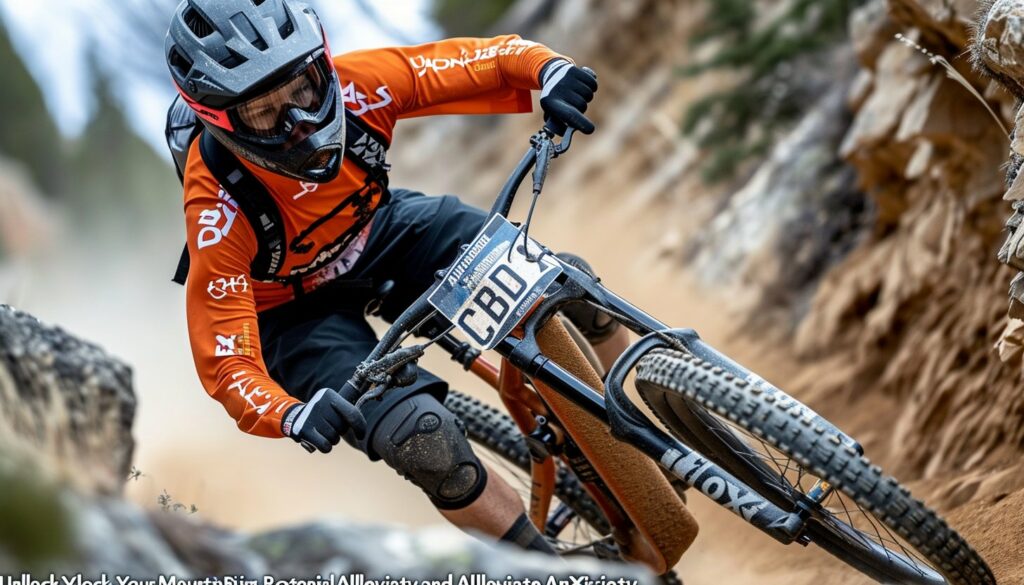CBD, or cannabidiol, is a non-psychoactive compound found in cannabis. In recent years, it has become increasingly popular for its many health benefits. In this article, we will discuss how athletes, particularly mountain bikers, can benefit from CBD to optimize their performance, manage their pain, improve their sleep and reduce their anxiety.
Sommaire
ToggleWhy choose CBD as an athlete?
Many professional and amateur athletes use CBD for several reasons:
- Pain relief: CBD has analgesic properties that can be beneficial for relieving muscle and joint pain after a long mountain bike ride.
- Recovery : Taking CBD may promote better recovery of muscles damaged during exercise, allowing athletes to return to training more quickly.
- Sleep : Good sleep is crucial for tissue restoration and memory consolidation, essential for the technical skills needed in mountain biking. CBD is known to have calming effects and promote sleep.
- Anxiety : Competitions and learning new techniques can cause stress. CBD has anti-anxiety properties that can help you stay calm before a race or during a tough workout.
Improve your sleep with CBD
As mentioned earlier, getting restful sleep is essential for athletes to optimize their performance. A study conducted in 2019 demonstrated that CBD could improve the quality and duration of sleep in people suffering from sleep disorders.1 Additionally, lower doses of CBD were observed to be more effective in aiding daytime alertness, which is crucial when racing or training.
How to use CBD for sleep?
There are different methods for consuming CBD:
- CBD oil: CBD oil can be taken sublingually (under the tongue) for rapid absorption and effective action. Start with a low dose (5-10 mg) and adjust according to your needs.
- CBD capsules: The capsules offer a precise dose and are more discreet. However, they take a little longer to act, because they must first pass through the digestive system.
- CBD infusions: Herbal teas and CBD-infused teas are an interesting option for those who want to combine relaxation with the benefits of cannabidiol. However, the bioavailability of CBD is lower with this method.
Reduce anxiety with CBD
Stress and anxiety can be detrimental to athletic performance. CBD has demonstrated potential anxiolytic properties in different studies2, which could help athletes overcome these psychological obstacles.
Using CBD to Reduce Anxiety
Any of the previously mentioned methods for sleep can also be used to manage anxiety. However, it should be noted that each individual reacts differently to CBD. Thus, it is recommended to start with low doses and observe the effects obtained before adjusting if necessary.
Manage pain with CBD
Mountain biking can cause muscle and joint pain due to the physical constraints imposed by this sport.
Local application of CBD
In addition to the methods mentioned above, the use of creams or balms containing CBD can be effective in providing local pain relief:
- Creams: CBD creams can be applied directly to the painful area for targeted and rapid action. They also have the advantage of being non-greasy and being quickly absorbed by the skin.
- Balms: CBD balms are generally richer and offer a soothing sensation upon application. They are particularly suitable for joint pain and for muscle massages.
It is important to note that CBD should not be used as a substitute for appropriate medical treatment if you are experiencing significant or persistent health problems. Do not hesitate to consult a healthcare professional before starting to use CBD, especially if you are already taking medication.
In summary
CBD offers athletes, particularly mountain bikers, several potential benefits for optimizing performance, improving sleep, reducing anxiety and managing exercise-related pain. There are different methods for consuming CBD depending on each person’s specific needs; However, it is advisable to always start with low doses and take into account possible contraindications.
1 Shannon S, Lewis N, Lee H, Hughes S. Cannabidiol in Anxiety and Sleep: A Large Case Series. Perm J. 2019;23:18-041. doi:10.7812/TPP/18-041
2 Blessing, E. M., Steenkamp, M. M., Manzanares, J., & Marmar, C. R. (2015). Cannabidiol as a Potential Treatment for Anxiety Disorders. Neurotherapeutics, 12(4), 825–836. https://doi.org/10.1007/s13311-015-0387-1



